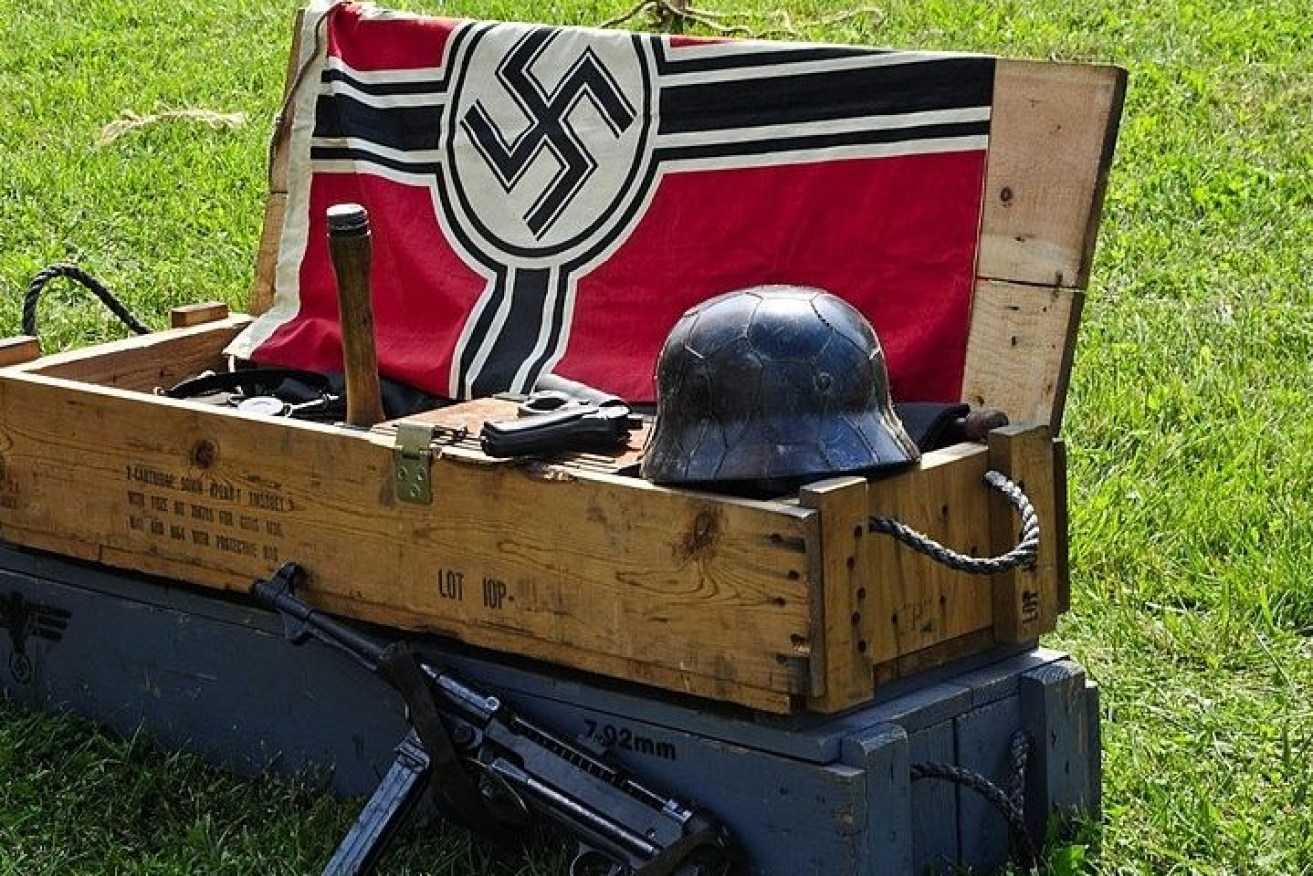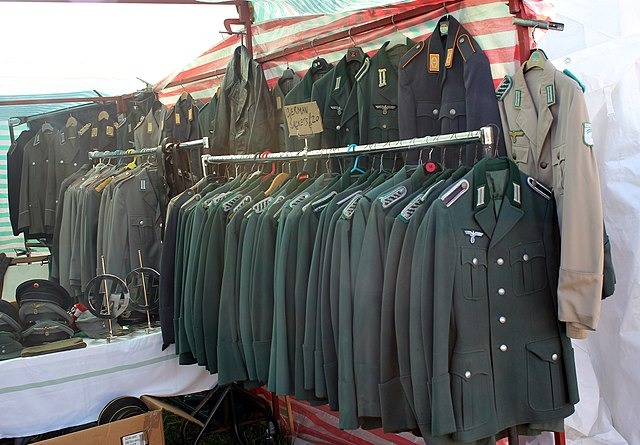Historical exemptions sought for Nazi symbols ban
A parliamentary push to ban the public display of Nazi symbols in South Australia has prompted History Trust concerns about the impact on historical displays and education.


File photo: A Nazi flag and replica World War II-era military equipment at a historical re-enactment event in Indiana, USA, in 2008. South Australian military collectors and re-enactors have expressed concern about a draft Bill to ban Nazi symbols from public display. Photo: Wikimedia Commons
A committee examining draft legislation to prohibit the display of Nazi symbols in South Australia has begun hearing evidence, with the inquiry this week publishing 26 submissions it received from various interest groups.
Introduced by One Nation MLC Sarah Game, the draft Bill would set a maximum fine of $20,000 or 12 months’ imprisonment for displaying a Nazi symbol in a public place.
It would also empower police to ask a person to remove a Nazi symbol on their property and impose a $1250 fine for refusing to comply.
The committee inquiry, also chaired by Game, has attracted interest from cultural and religious groups, historical societies, collectors and SA Police.
The History Trust of South Australia, which runs the Maritime Museum, the National Motor Museum, the Migration Museum and the Centre of Democracy, submitted to the committee that an exemption to the ban is included for “genuine cultural, educational or artistic purpose”.
Appearing before the committee last week, History Trust head of collections Mandy Paul said there were “numerous examples in our collection of symbols of the Third Reich, including swastikas, which are part of official documents”.
“We would only display those items in a context where we are talking about the impact of Nazism and also Nazism in South Australia during that period,” she said.
“That is one of the examples of how the History Trust might seek to use an exemption under any legislation.
“There are lots of different ways in which those symbols appear in our collection and, while we are really committed to telling those stories in ways that can’t in any way be interpreted as supporting Nazi or Neo-Nazi ideology, we would ask you to consider exemptions for cultural or educational purposes.”

History Trust chair Elizabeth Ho OAM. Photo: Facebook/Centre of Democracy
The draft legislation does currently include exemptions for displays of Nazi symbols that serve a “legitimate public purpose”. The four exemptions are:
- Displays for a “genuine academic, artistic, religious or scientific purpose”.
- Displays for a “genuine cultural or education purpose”.
- Displays for the purpose of “publishing a fair and accurate report of any event or matter of public interest”.
- Displays in opposition to fascism, Nazism or neo-Nazism.
History Trust chair Elizabeth Ho said their museums would seek the education exemption.
“We are educational in purpose, and we don’t just display things without a context,” she said.
But Ho, who is also a board member of the Adelaide Holocaust Museum, said the issue gets murkier when it comes to private collections of Nazi-era military items.
“A collector might have something on display without actually saying anything about it, apart from the fact that it came from Germany in 1938, which wouldn’t really let them off the hook, in my opinion,” she said.
“I think this is a very difficult topic. Certainly, in Germany (which has also banned Nazi symbols) some situations have ended up in court for decision.”
The draft legislation in South Australia outlines that a display of a Nazi symbol “will not be taken to be for a legitimate public purpose” if a reasonable person would understand it to be “directly or indirectly encouraging, glorifying, promoting or condoning fascism, Nazism, neo-Nazism or other related ideologies”.
I’m struggling to imagine a circumstance in which a collector would wish to amass a collection of Nazi memorabilia in an ideologically neutral way.
The terms of the draft bill have prompted concern from the Antique and Historical Arms Association of SA (AHAASA), a firearms collectors club representing 165 members.
In a submission to the committee, AHAASA secretary Don Harvy urged an exemption be added for “historical” displays of Nazi symbols, warning the legislation in its current form could have “unintended consequences”.
“Whilst on the surface… the Draft Bill may seem to indemnify genuine collectors, unfortunately the interpretation as to whether or not the display is a genuine collection/display rests with any police officer at the time,” AHAASA secretary Don Harvy wrote.
“The AHAASA has members who have quite valuable German Miliary memorabilia including firearms, uniforms, and decorations.
“If these collections were to become illegal does the government intend to compensate these collectors?”

German World War II-era military gear on show at a military re-enactment in the UK. Military collectors in South Australia say a ban on Nazi symbols could impact their private collections. Photo: Wikimedia Commons
Harvy said the Association “agrees with the intent” of the legislation but it needed to be amended.
“There is a potential that a genuine collector may be prosecuted for breaching the proposed legislation, once enacted, only to incur great personal expense within the judicial system to vindicate their original purpose of their display,” he wrote.
The Combined Firearms Council of SA (CFC) expressed a similar view.
We do have a responsibility to never forget that dark history and to forward this history on to generations to come. This is where memorabilia from World War 2 is a valuable asset and should never be lost.
The Council, which represents gun shops, shooting clubs and historical re-enactment societies, sought assurances from the committee that Nazi-era firearm collections and uniforms used for re-enactments and historical displays will be protected as a “legitimate public purpose”.
“CFC and our member groups support any legislation that will seek to outlaw irresponsible and unlawful activities that glorify the hate and persecution by the Nazis of Jewish people… but respectfully note that there is an unintended consequence in the current wording of the Amendment Bill,” CFC vice president Michael Hudson submitted.
“Our many Firearm Historical Collectors, Wartime Vehicle and Artillery Collectors and Re-enactment Groups have requested that the CFC write to you to seek confirmation, that those who participate in the display of Firearms and other equipment including period uniforms with accruements for Historical and Re-enactment activities – to also fall under ‘legitimate public purpose’.”
Hudson said none of the collector and re-enactment groups “have any intention or desire in ‘glorifying, promoting or condoning fascism, Nazism, neo-Nazism or other related ideologies’”.
He asked the committee to add an exemption for “historical” displays.
“There are many legally registered firearms and other items such as; period uniforms and military items including cannons and war time vehicles etc. owned and used by genuine Collectors and Re-enactors in displays in South Australia, that due to their time of manufacture in Europe during World War II, have common Nazi marking and symbols on them and these Collectors and Re-enactors display their items,” Hudson said.
“These groups participate in their activities at public events and displays such as Anzac Day and other similar times, including at RSL Halls and many other areas for genuine historical reasons.”

Replica military gear on show at a military re-enactment in the UK. Photo: Wikimedia Commons
The Victor Harbor RSL sub-branch, also criticised the draft legislation, with museum curator Robert Suba telling the committee he has “grave concerns of the ramifications… to such organisations such as the R.S.L, as well as private museums and indeed many collectors of military memorabilia.”
“As a R.S.L. we have many souvenirs from the North African conflict and of course all the German items have the Nazi symbol displayed on them somewhere,” he wrote.
“We do have a responsibility to never forget that dark history and to forward this history on to generations to come. This is where memorabilia from World War 2 is a valuable asset and should never be lost.
“Therefore I would like to urge the Committee to consider amending this Bill so R.S.L.s, Museums collections and private Museums and including private collectors can display these items as historical artifacts only without the fear of prosecution.”
But History Trust curator Paul questioned whether military memorabilia collections should be afforded an exemption under the legislation.
“I would argue that those collections are not being used for educational or cultural purposes; actually that they are used for their personal collections and their purpose is not to do that genuine sharing and reflecting upon history,” she said, adding that it was her personal view and not the History Trust’s.
“I can understand that collectors may feel disadvantaged by that. Maybe there would be some sort of amnesty or compensation system such as there is with gun buybacks, I don’t know.
“But I’m struggling to imagine a circumstance in which a collector would wish to amass a collection of Nazi memorabilia in an ideologically neutral way.”
Asked by InDaily to comment on the submissions so far, committee chair Game said in a statement she was “going through the select committee process and gathering information and perspective from all sides”.
“But there is no place in society for the symbol being used to promote hatred towards any group of people.”
The inquiry continues.




